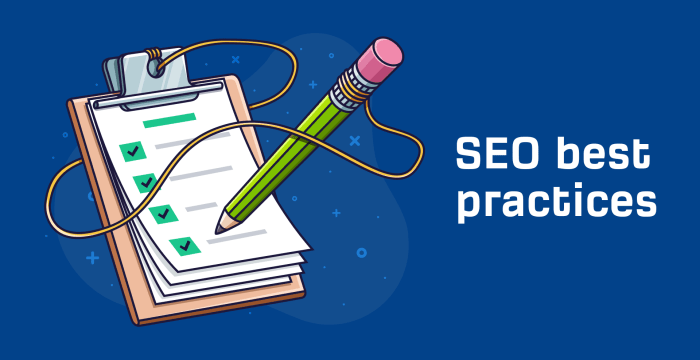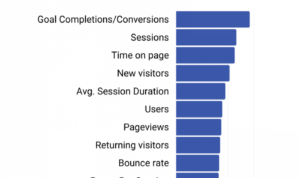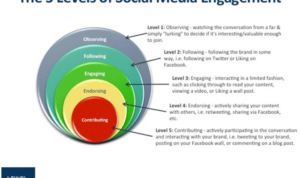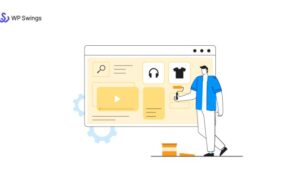SEO Best Practices – Best Practices – dive into the world of optimizing your website for success with these tried and true methods that will take your online presence to the next level.
From increasing website traffic to improving search engine rankings, these practices are key to dominating the digital landscape.
Discuss the importance of Best Practices

In today’s digital world, implementing best practices is essential for any website looking to increase its visibility and reach a wider audience. By following these practices, websites can experience a significant boost in traffic, improved search engine rankings, and ultimately, increased business success.
best practices play a crucial role in driving organic traffic to a website. For example, optimizing website content with relevant s can help attract users who are actively searching for products or services related to those s. This targeted traffic is more likely to convert into leads or customers, leading to a higher ROI for the business.
Improving search engine rankings is another key benefit of implementing best practices. Search engines like Google prioritize websites that are well-optimized and provide valuable content to users. By following best practices such as creating high-quality content, optimizing meta tags, and building quality backlinks, websites can climb higher in search engine results pages (SERPs) and reach a larger audience.
For businesses, implementing best practices can lead to increased brand visibility, credibility, and trust among consumers. When a website appears at the top of search engine results, users are more likely to perceive it as a reputable source of information or products. This can result in higher click-through rates, more conversions, and ultimately, improved revenue for the business.
In conclusion, best practices are essential for any website looking to succeed in today’s competitive online landscape. By following these practices, websites can drive more organic traffic, improve search engine rankings, and achieve long-term business growth and success.
On-Page Best Practices

When it comes to boosting your website’s visibility on search engines, on-page is the name of the game. This involves optimizing various elements on your website to improve its search engine rankings and attract more organic traffic. By focusing on on-page optimization, you can make it easier for search engines to understand what your website is all about and rank it accordingly.
Key On-Page Elements to Optimize
- s: Incorporate relevant s in your page titles, headers, meta descriptions, and throughout your content to signal to search engines what your page is about.
- Quality Content: Create high-quality, engaging content that provides value to your audience and keeps them on your site longer.
- Meta Tags: Optimize your meta titles and descriptions with relevant s to improve click-through rates from search engine results pages.
- URL Structure: Use descriptive and -rich URLs that are easy for both users and search engines to understand.
- Internal Linking: Link to other relevant pages on your website to improve navigation and help search engines discover and index your content.
- Image Optimization: Optimize images with descriptive filenames and alt text to improve accessibility and provide additional signals to search engines.
Optimizing Meta Tags for On-Page
Meta tags play a crucial role in on-page by providing search engines with information about your web pages. By optimizing your meta tags, you can improve your website’s visibility in search engine results pages and attract more clicks. Here are a few tips to enhance your meta tags for better on-page :
- Title Tag: Include your target near the beginning of your title tag and keep it under 60 characters to ensure it displays properly in search results.
- Meta Description: Write a compelling meta description that summarizes the content of your page and entices users to click through to your website.
- Meta s: While meta s are no longer a major ranking factor, it’s still a good practice to include relevant s that reflect the content of your page.
Off-Page Best Practices
When it comes to off-page , it’s all about increasing your website’s authority and credibility in the eyes of search engines. This plays a crucial role in determining your website’s ranking and visibility in search results.
Off-page mainly focuses on building external signals such as backlinks and social media presence to show search engines that your website is trustworthy and relevant to users. Let’s dive into some key strategies to boost your off-page efforts.
Building High-Quality Backlinks
Building high-quality backlinks from authoritative websites is essential for improving your website’s off-page . These backlinks act as upvotes for your site, indicating to search engines that your content is valuable and worth ranking higher in search results.
- Focus on creating valuable and relevant content that naturally attracts backlinks from other websites.
- Reach out to industry influencers, bloggers, and websites for guest posting opportunities to secure backlinks.
- Utilize online directories, forums, and social bookmarking sites to create quality backlinks to your website.
Importance of Social Signals
Social signals, such as likes, shares, and comments on social media platforms, play a significant role in off-page . These signals indicate to search engines that your content is engaging and valuable to users, ultimately boosting your website’s authority.
- Engage with your audience on social media platforms to increase social signals and drive traffic back to your website.
- Create shareable content that encourages users to engage and share it with their networks, amplifying your reach and improving your off-page .
- Monitor and analyze social signals regularly to understand what resonates with your audience and optimize your social media strategy accordingly.
Technical Best Practices: SEO Best Practices
In the world of website optimization, technical plays a crucial role in ensuring that your site performs at its best. By focusing on the technical aspects of your website, you can improve its overall performance and user experience.
Importance of Technical , SEO Best Practices
When it comes to technical , attention to detail is key. Optimizing the technical elements of your website can help search engines crawl and index your site more effectively, leading to improved visibility and rankings. Additionally, a well-optimized site can provide a better user experience, which can lead to higher engagement and conversions.
- Ensure proper website structure and navigation to help search engines understand your content.
- Optimize meta tags, headings, and image alt text to improve relevance and accessibility.
- Implement schema markup to provide additional context to search engines about your content.
- Fix any broken links or redirects to prevent crawl errors and improve user experience.
Site Speed Optimization
Site speed is a critical factor in technical best practices. A fast-loading website not only provides a better user experience but also has a positive impact on search engine rankings. Slow-loading sites can lead to higher bounce rates and lower rankings, so optimizing your site speed should be a top priority.
- Compress images and minify CSS and JavaScript files to reduce page load times.
- Enable browser caching to store static resources locally, reducing load times for returning visitors.
- Utilize a content delivery network (CDN) to distribute content across multiple servers for faster delivery to users.
- Audit and optimize server response times to ensure quick loading speeds for all users.





